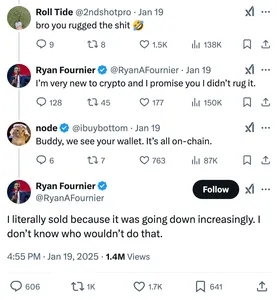The hosts of the Bankless crypto podcast have landed in hot water after selling off some of the substantial quantities of $AICC tokens they were allocated as investors in the project. The $AICC project was launched by ejaaz, a co-host on an affiliated Bankless podcast, and had been promoted on Bankless shows. Each co-host received 9 million $AICC tokens in exchange for their 5 SOL (~$950) investments. The brand's venture capital arm, Bankless VC, also invested 2 SOL (~$380) and received a 3.64 million token allocation.Shortly after the token's public launch, Bankless VC dumped 300,000 AICC (8% of their allocation) for 344 SOL ($65,300). By immediately dumping tokens on retail when the token opened for public trading, they were able to sell the tokens for an average of $0.22 — considerably higher than the $0.05 to $0.11 the token has been trading at over the last 24 hours.
When questioned about the trades, Bankless host David Hoffmann wrote: "Agree that Bankless Ventures should not be selling tokens - that was an impulsive mistake." He announced that they had repurchased the tokens they had sold, and were "discussing a self-imposed vesting schedule" for selling tokens that they themselves had promoted.
They later posted a long apology in their Discord, blaming the sales on Ben Lakoff, a general partner of Bankless VC. "Ben did not have context for this, and was in the mindset of trading a local high as you might trade a meme coin you're bullish on - or there's no way he would have done this - huge mistake, first time something like this has happened - he's devastated", explained Bankless co-host Ryan Sean Adams. He also placed some blame on AICC for not imposing any token lockups or vesting schedule that would prohibit early investors from dumping tokens on retail.





















![[person 1]
yeah the two meme tokens that everyone was excited about seem to be blacklisted now
[person 2]
0xea4E0CfF21Ea0a1650B658AAf5142720195245bB Is this what the team members do?
[person 3]
aibo now forbidden on explorer...
[person 4]
I just wanted a cute robot dog koin?
[person 5]
Why are you honeypotting coins lol
[person 1]
this is very bad vibes
[person 2]
A disastrous beginning
[person 1]
obviously not end-of-the-world but people bridged to Soneium to ape new memecoins and seeing themselves get locked out and rugged in real time](https://primary-cdn.web3isgoinggreat.com/entryImages/resized/sony-rug_300.webp)





















